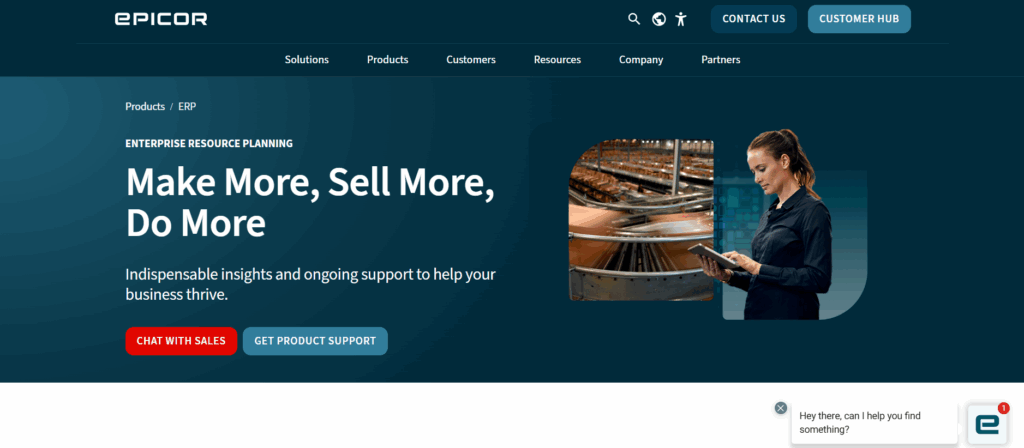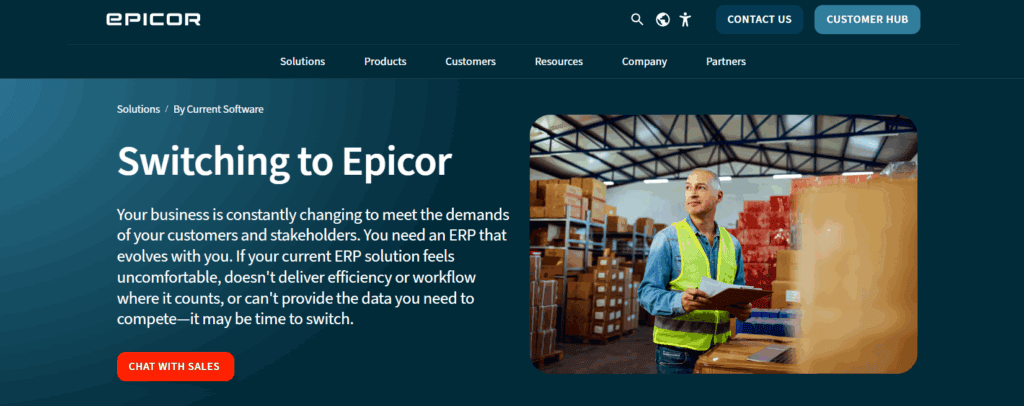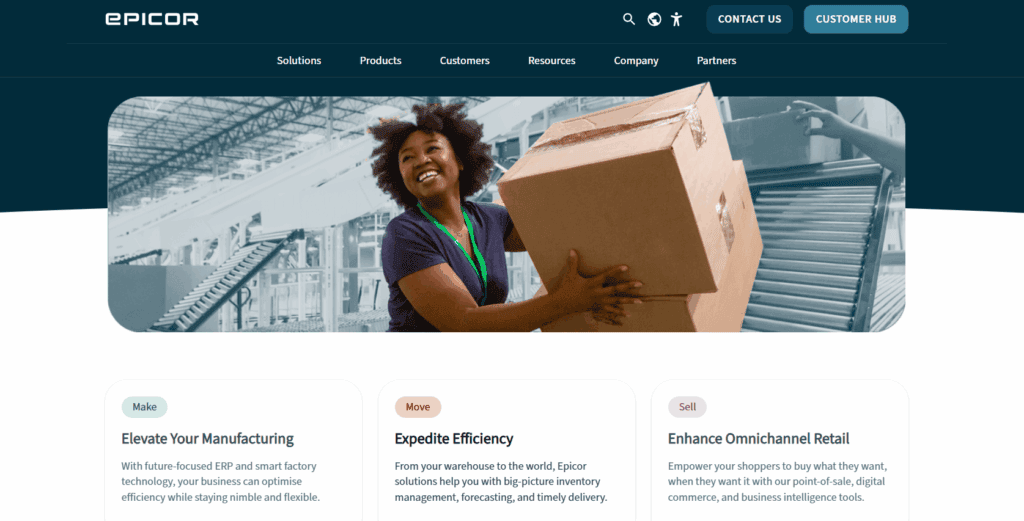Epicor Software Review

Epicor Software is a well-established name in the Enterprise Resource Planning space, with its roots going back to 1972. Based in Austin, Texas, the company has built a reputation for delivering ERP solutions that cater specifically to the needs of industries like manufacturing, distribution, retail, and professional services. Over the years, Epicor has evolved from offering legacy systems to launching cloud-ready, modern platforms, with Epicor Kinetic currently at the forefront. Lets read more about Epicor Software Review.
What distinguishes Epicor is its emphasis on depth rather than breadth. Instead of providing a generic platform, Epicor incorporates customized features into its ERP solutions for specific industries. This focused method assists companies in intricate industries like discrete manufacturing and supply chain management in overseeing compliance, resources, and workflows more efficiently.
Epicor has a worldwide presence, catering to over 20,000 clients across more than 150 nations. Its ERP solutions come in both cloud and on-premise formats, offering flexibility according to infrastructure requirements and regulatory conditions. The cloud deployment of Epicor Kinetic is becoming increasingly popular because of reduced initial IT expenses, simpler upgrades, and improved scalability.
Despite its strengths, Epicor’s industry focus sometimes requires expert consulting for setup and configuration, which may increase implementation time. Legacy users might also face challenges transitioning to Kinetic’s modern interface. Still, Epicor remains a reliable choice for organizations seeking ERP software that aligns closely with their operational complexity.
User Interface and Experience | Epicor Software Review
Epicor has made noticeable progress in improving its user interface, particularly with the launch of Epicor Kinetic. This web-based platform offers a more intuitive and responsive experience than previous versions. Its interface is clean and user-friendly, with customizable dashboards and widgets that users can adapt based on their roles and daily tasks.
Navigation is largely seamless, though users familiar with older versions may need some time to adjust to the updated layout. The simplified menu system reduces clutter, and most core functions can be accessed with just a few clicks. Role-based dashboards allow departments to focus on relevant workflows, improving productivity and reducing distractions.
Epicor supports mobile access for teams that need real-time updates outside the office, such as field service staff or warehouse managers. However, the mobile experience still trails behind CRM or sales platforms that prioritize mobile-first design.
Customization is another strong point. Users can adjust KPIs, tweak workflows, and even create apps using low-code tools built into the platform. This gives tech-savvy teams the flexibility to tailor the system to their specific needs.
That said, some older modules within the system still retain a dated look and feel, leading to inconsistencies in the overall user experience. While the interface is moving in the right direction, full modernization is still in progress.
Core ERP Capabilities
Epicor’s ERP suite includes all the standard modules businesses expect; finance, procurement, inventory, production planning, and customer relationship management. Its standout features lie in manufacturing and supply chain management, where Epicor offers tools designed to handle complex operations with precision.
The finance module covers general ledger, accounts payable and receivable, budgeting, and multi-currency capabilities. These tools are tightly integrated with other business processes to ensure seamless financial reporting. Inventory management includes real-time tracking, barcoding, lot control, and location-based inventory views.
In production management, Epicor stands out with its assistance in job scheduling, capacity planning, and material requirements planning. This makes it perfect for producers overseeing intricate product assemblies and floor operations.
Customer and supplier modules provide complete insight into pricing, performance metrics, and communication records. The field service management module assists companies that offer maintenance or support, featuring tools intended to handle service requests and equipment documentation.
Another major strength is the consistency of data across modules. Changes implemented in one section are immediately visible in other areas, reducing mistakes and redundancies. Nevertheless, fully utilizing the potential of these tools often demands considerable training and setup. Organizations lacking internal ERP expertise may find it challenging to harness the platform’s complete capabilities.
Industry-Specific Solutions
Epicor’s deep commitment to industry-specific ERP is a major differentiator. Instead of forcing businesses to adapt to generic systems, Epicor delivers pre-configured solutions tailored to the operational needs of industries like manufacturing, distribution, retail, automotive, and building supply.
In manufacturing, Epicor supports both discrete and process production, along with hybrid operations. Features such as advanced scheduling, quality control, and compliance tracking are built into the system. For distributors, the ERP focuses on warehouse coordination, logistics, and inventory forecasting.
Retailers benefit from centralized pricing, POS integration, and real-time inventory synchronization across locations. Automotive businesses get features like part tracking, warranty management, and supplier portal integration. These configurations use industry-specific language and processes, reducing the need for heavy customization.
Industry-specific compliance tools also add value. For instance, manufacturers in regulated industries can manage traceability and documentation requirements more efficiently. These built-in capabilities help businesses avoid relying on third-party systems or workarounds.
However, this vertical focus can also lead to feature silos. Capabilities developed for one industry might not work well in another, which could limit flexibility for businesses with operations in multiple sectors. Still, for companies operating within Epicor’s targeted verticals, the benefits of a purpose-built ERP are significant.
Deployment Options and Cloud Strategy
Epicor offers a range of deployment models, including on-premise, cloud, and hybrid environments. This flexibility accommodates a wide variety of business needs, from companies with legacy infrastructure to those prioritizing digital transformation.
Epicor Kinetic is at the heart of its cloud strategy. Developed on Microsoft Azure, Kinetic offers browser-based accessibility, automated updates, and lowered IT costs. Companies gain advantages from scalability, robust infrastructure, and the capability to access the system remotely.
Epicor still provides the option for organizations that choose or need on-premise systems. Such implementations are typical in industries that have stringent data governance regulations or prior IT expenditures. Hybrid models are also offered, allowing a gradual transition to the cloud.
A key benefit of the platform is its modular nature. Businesses can begin with a handful of features and grow as required, facilitating gradual rollout and reducing upfront costs. The cloud model further encompasses uptime assurances and performance enhancement via service level agreements.
While cloud deployment simplifies maintenance, migrating from legacy systems requires careful planning. Businesses must consider data transfer, employee training, and process adjustments. Despite these challenges, Epicor’s flexible deployment strategy makes it adaptable for a broad range of operational environments.
Integration and Compatibility
Integration is a critical component of ERP success, and Epicor provides strong tools in this area. The platform supports RESTful APIs that enable real-time data sharing with third-party applications, including CRM, HR, e-commerce, and business intelligence tools.
Epicor Kinetic has been designed with open architecture in mind. Its Integration Cloud platform supports both out-of-the-box and custom connectors, allowing businesses to link with tools such as Salesforce, Microsoft Power BI, and Shopify.
Legacy system compatibility is another area of focus. Epicor includes middleware and transformation tools to support data migration and dual-system operations, which is helpful for businesses gradually phasing in new modules.
Internally, all core modules are fully integrated. This ensures consistent data across departments, enhancing reporting accuracy and operational coordination. For example, updates in finance automatically reflect in inventory or procurement modules.
However, integrating Epicor with highly customized software may require technical assistance. The APIs are capable but not always easy for non-technical users to manage. Small businesses without IT resources may need to rely on external consultants for more complex integrations.
Overall, Epicor’s integration capabilities are robust, especially within the Kinetic ecosystem. Its architecture supports both flexibility and structure, enabling businesses to create cohesive software environments.
Reporting, Analytics, and BI Tools
Epicor prioritizes analytics and reporting, acknowledging that immediate data is crucial for making strategic decisions. The system features a diverse array of pre-designed reports covering areas such as finance, inventory, and production.
Epicor Kinetic enhances reporting through interactive dashboards that showcase essential metrics in real time. These dashboards are tailored to specific roles and are user-friendly, allowing individuals to examine data without needing extensive technical expertise. Reports can be tailored and set up for routine distribution.
The platform additionally allows integration with Microsoft Power BI, providing enhanced visualization and data modeling features. Companies can utilize these tools for predicting outcomes, analyzing performance, and planning finances.
For businesses with specific inventory or supply chain needs, Epicor’s Smart Inventory Planning and Optimization suite provides enhanced forecasting tools. Users can create ad hoc reports with drag-and-drop tools, though some training is recommended to maximize this feature.
Initial setup can be time-consuming, especially for organizations unfamiliar with Epicor’s data structure. However, once configured, the analytics tools are powerful and adaptable, supporting a wide range of business intelligence objectives.
Security, Compliance, and Data Management
Epicor incorporates a comprehensive set of features designed to meet modern security and compliance standards. Whether deployed in the cloud or on-premise, Epicor uses role-based access controls to limit system access based on user roles and responsibilities.
The Kinetic platform benefits from Microsoft Azure’s security infrastructure, which includes encryption, firewalls, and continuous monitoring. All data is encrypted in transit and at rest, ensuring strong protection against cyber threats.
Audit trails are built into the platform, making it easier for businesses to track system changes and maintain accountability. Epicor also includes support for global compliance standards, such as GDPR, HIPAA, and SOX. Built-in tools help manage document control, data retention, and user authentication.
Cloud deployments include daily backups and failover protocols, with options for region-specific data hosting. On-premise users can configure backup policies according to their internal protocols.
While Epicor provides the foundation for secure operations, each business must implement additional controls based on its unique risk profile. The tools are available, but proactive governance is essential to maintaining security and compliance.
Customer Support and Training
Epicor provides a multi-layered support system that includes a self-service portal, technical assistance, and structured training programs. Customers can access help through a centralized portal that offers ticket submission, knowledge base resources, and resolution tracking.
Phone and email support are also available, with service quality depending on the level of support purchased. Epicor offers onboarding help, including training sessions, webinars, and access to the Epicor Learning Center, where users can take tutorials and earn certifications.
Community forums and user groups provide an additional level of assistance. Users are able to exchange insights, resolve problems, and explore best practices. These peer networks are often useful for addressing specific challenges or enhancing configurations.
Nonetheless, response durations and problem-solving may differ. Although important issues tend to be addressed first, minor or intricate problems might require more time to resolve. In certain situations, premium support levels are necessary for quicker assistance or expert guidance. In general, Epicor’s support system is robust, particularly for businesses that prioritize education and utilize all accessible resources. The quality of support might still differ based on the type of issue and the availability of consultants.
Pricing and Licensing Structure
Epicor’s pricing is based on several factors, including deployment type, modules selected, user count, and customization requirements. Although the company does not list fixed pricing publicly, it typically uses a modular structure, allowing customers to pay for only the features they need.
For cloud deployments, pricing operates on a subscription model and generally covers updates, support, and hosting. On-premise users adhere to a perpetual licensing model, which includes initial software payments and yearly maintenance expenses.
Companies ought to take into account the total cost of ownership, which encompasses implementation, training, integration, and continuous support. Extensive configuration can greatly raise expenses. Even though Epicor is less expensive than certain Tier 1 ERP systems such as SAP, it might still be inaccessible for smaller companies.
In specific areas or sectors, Epicor partners provide pre-set bundles that can simplify implementation and lower expenses. Nonetheless, a comprehensive ROI analysis is advisable before moving forward, especially for companies with intricate requirements or constrained IT capabilities.
Frequently Asked Questions
Q1: Is Epicor suitable for small and mid-sized businesses, or just enterprises?
Epicor is mainly geared toward mid-sized businesses but is scalable enough to serve both smaller firms and large enterprises. Its modular and cloud-based options offer flexibility for growing organizations.
Q2: How long does it take to implement Epicor ERP?
Implementation timelines vary widely, from a few months to over a year. Factors include deployment type, customization scope, and internal readiness. Cloud implementations tend to be faster.
Q3: What makes Epicor different from other ERP systems like SAP or NetSuite?
Epicor’s industry-specific focus, deep manufacturing functionality, and flexible deployment options set it apart. It prioritizes operational alignment over general applicability, which benefits companies with complex processes.








